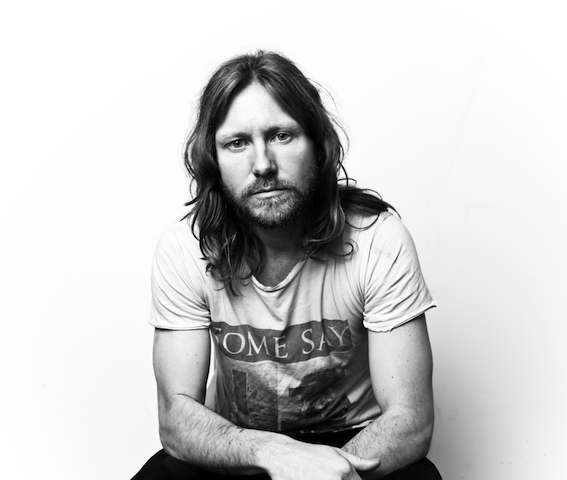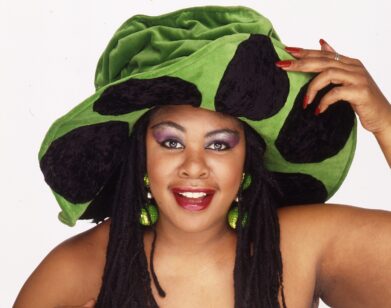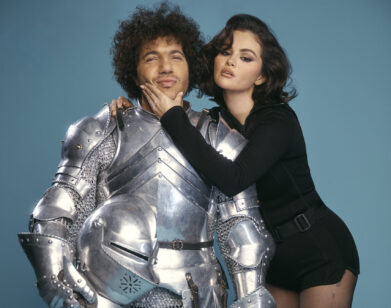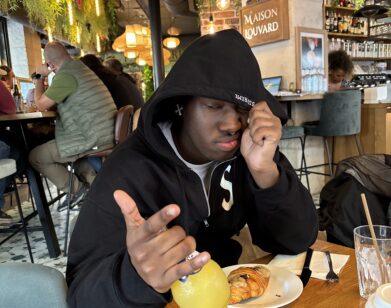Cory Branan Focuses

PHOTO COURTESY OF BLOODSHOT RECORDS.
Nearly a decade after his first release, much-lauded singer-songwriter Cory Branan is back with all bite and no bark. Six years in the making, Mutt’s pedigree is a mystery, but with Tom Waits-like melodies and Tom Petty lyrical acrobats, its lineage is abundantly clear. Some tracks are bread-and-butter Americana; others are downright whimsical. All feel utterly lived in—a musical equivalent to worn leather where buttery smoothness rewards initial discomfort. Mutt transcends geography, with some tracks peaking out from a prohibition era New Orleans speakeasy while others coast along the Mississippi.
Whether the protagonist or antagonist in his own set of narratives, Branan coaxes listeners firmly to his side with his whiskey-smooth croon and a transparency that is somehow bold and vulnerable all at once.
Mutt is an assembly of rhyming invectives, lamentations, and near-sermons that ask for recognition without demanding pity. Interview called a disarmingly upbeat Branan on the road while driving a “hideous Ford Focus down the highway,” to find out more.
DUBERMAN: This is your first album release in six years. What did you do in the interim? Were you writing consistently during that period?
BRANAN: Well I did put out a split record with another band, but this is my first full length in six years. Nothing really changed. I kept on the road. I actually recorded this record about two years ago. It took a while to record and master, I recorded it on my own and I just took a chance. I shopped it for a while, getting stuck against a wall for a bit. Then once you sign a contract, it takes another six months. It’s the nature of the beast. It takes a while. Hopefully now that I found a home it will be easier.
DUBERMAN: The way people approach distributing and promoting music has completely changed, even from six years ago. Did you have to confront anything that surprised you?
BRANAN: Nothing specific I guess. Like you said, it’s a sea change now with everything. The amount of pressure is certainly different, with all the blogs and magazines.
DUBERMAN: After having some commercial or critical success, do you find yourself writing from a more self-conscious place? How do you maintain that element of purity even when you know that people are listening and what they might be listening for?
BRANAN: I tried my best not to think about it. I really don’t think anybody’s listening [laughs]. I’m always surprised to find out they are. I just try to make an impression on myself, maybe in a selfish way—as long as I’m happy with it. The only criteria is that hopefully I write something that no one else could write, not in the sense that it’s better or more special, but I like my songs to seem like they couldn’t be written by anyone else, for better or for worse.
DUBERMAN: This is kind of a paradoxical question given that the album is called Mutt, but what’s the unifying element?
BRANAN: Musically, it’s all over the fucking place. It’s been six years, so I had a pile of songs. Making a cohesive album that made sense, and putting together the left over pieces with more rhyme and reason, was really important.
DUBERMAN: Is that different from your past efforts?
BRANAN: I was definitely trying to make these link up more to make a real album. The last record was 12 songs and they were all so different to the point that I called it Twelve Songs. I’ve written songs that I ended up changes lyrics to draw all the songs together more. They are definitely connected, and in the right order.
DUBERMAN: Your songs have a story-telling element, does that mean you give a lot of thought to track order?
BRANAN: Much more so this time around, for the reason you said. Even to the point of say, like on the track “Snowman” the worst outcome of that song shifts into the most nostalgic song. They were very, very carefully chosen.
DUBERMAN: Do you play them that order?
BRANAN: No, definitely not. There’s a lot of variables to what I play at the shows. Mainly how many drinks I’ve had [laughs].
DUBERMAN: Do you think about how they are going to translate live?
BRANAN: No, not really. I would love to have a band that could flesh these out on the road. It’s just sheer economics. I would love to have it, but right now I’m driving the most hideous Ford Focus down the high way with my fiancé to get to the next show. I travel fast and light.
DUBERMAN: On that note, have you always been a solo artist or have you ever been part of a band?
BRANAN: I’ve always been a solo artist and I’ll just bring a band into the studio. I would love to have a band though. Where everybody is creating, it would be great. I don’t know when I’d have it.
DUBERMAN: The songs are so lyric-driven and have such a narrative quality. Do you come up with melodies to suit the lyrical theme, or lyrics to suit the mood of the sound?
BRANAN: The lyrics always come first. Sometimes I’ll try and put music in the lyrics. My melodies aren’t Bacharach, they aren’t intervals. They’re very linear melodies. But that’s characteristic of a lot of my heroes – Tom Waits, Leonard Cohen. They’re trying to get as close to conversation as they can. So the lyrics usually determine the melodies and the mood of what I’m saying.
DUBERMAN: I ask that because you have a song called “Survivor Blues” on the record twice, but with two very different orientations and feels.
BRANAN: I just envisioned the spirit of the song in two ways. One has very anxious, “get the fuck out of here” kind of feeling and the other is more mellow. I liked them both, so I put them both on there [laughs].
DUBERMAN: Your songs have a strong literary influence.
BRANAN: I’m a huge fan of Gabriel García Márquez. I appreciate how he does a mix of casting a new light on matter of fact things, and instills it with a magic you can’t really see. Something so basic he’ll deliver with such magic.
DUBERMAN: Can you relate to that at all? Is the subject of your songs a hypothetical character you are creating, or is it always you?
BRANAN: The more I care about what I’m writing about, the more of myself I’ll put into it. It’s not always a diary though, and sometimes I do create a character. It’s a mix of both.
DUBERMAN: What’s the greatest compliment someone could pay you?
BRANAN: That’s interesting. Maybe that I had good parents?
DUBERMAN: That’s not a compliment to you, that’s a compliment to your parents.
BRANAN: Well, I guess if they followed it with “and it shows”?
DUBERMAN: Did your label fight you on the album art? I assume in most parts of the country it won’t be front and center on shelves…you look great by the way.
BRANAN: [laughs]. They didn’t hesitate. I didn’t think they were going to do it, but they were on board. Amazon censored it, but Best Buy didn’t which is strange. But they didn’t balk. I’m more worried about my mother. She hasn’t seen it yet.
CORY BRANAN IS PLAYING AT THE MERCURY LOUNGE IN NYC TONIGHT, JUNE 22ND. MUTT IS OUT NOW VIA BLOODSHOT RECORDS. YOU CAN LISTEN TO “BAD MAN” HERE.






